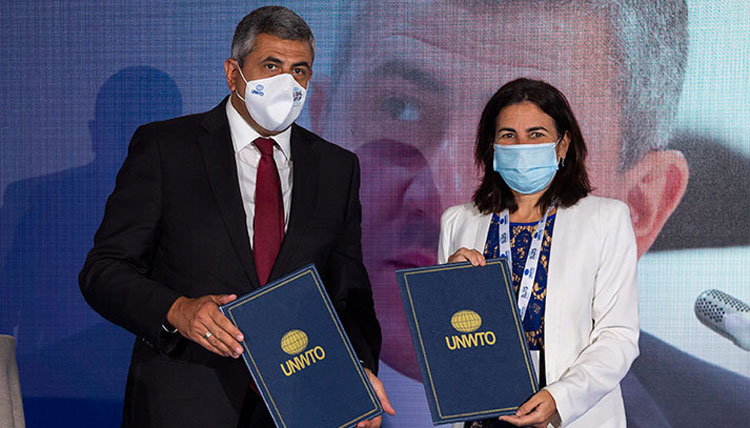The Diplomat
Telefónica and the UNWTO renew their commitment to cooperate to promote tourism through sustainable and competitive development based on digitalisation and the application of new technologies such as cloud computing, big data, artificial intelligence (AI), etc.
Restarting tourism and fostering opportunities is the basis of this new partnership. As such, the UN specialised agency for tourism and Telefónica will continue to work together, globally to foster global and regional innovation ecosystems; provide technical support to initiatives aimed at accelerating recovery; and drive the adoption of new technologies.
This global framework agreement was ratified by Zurab Pololikashvili, Secretary General of the World Tourism Organization (UNWTO), and María Jesús Almazor, CEO of Cybersecurity and Cloud at Telefónica Tech, and is framed within five major areas of action: digital entrepreneurship; digital education and training; application of new technologies (big data, artificial intelligence, etc.); digital economy and, with special emphasis on the development of rural tourism.
Speaking at the event, Mr Pololikashvili said: “The restart of tourism will need new ideas and the best talent. We need to support innovators and entrepreneurs who can transform our sector. UNWTO’s partnership with Telefónica builds global and local ecosystems to support innovation and accelerate the digital transformation of tourism.”
For her part, María Jesús Almazor, stressed that “technology increases the productivity and resilience of businesses. The implementation of digital solutions in the tourism sector makes it possible to develop a differential, personalised and secure tourism offer that is more focused on behavioural patterns and the management of spaces, which will undoubtedly contribute to the recovery of a key activity for the economy in general”.
Common objectives, projects carried out
In this sense, and as a result of the previous collaboration agreement, Telefónica Tech and the UNWTO carried out an exhaustive analysis of the tourism received by the more than 150 member States, which consisted of the design and implementation of four dashboards so that the information could be consulted by regions, countries and even at a global level.
These visualisation tools are available within the UNWTO Tourism Data Dashboard which allows better access and understanding of key global tourism indicators (origin and destination flows, accommodation supply and demand, employment and seasonality) helping destinations to plan and manage their products more effectively and even improve tourism flows in a context of new health and safety protocols being implemented in response to COVID-19. At a time when market intelligence is key to recovery, this analysis also allows us to understand behavioural patterns to better address some of the challenges facing tourism and to draw relevant conclusions that influence decision-making.
Similarly, both organisations will continue to collaborate in identifying disruptive projects that contribute to the sustainability of the sector, as was done in the UNWTO SDGs Global Startup Competition, which brought together more than 10,000 participants from 138 countries. The winners are being analysed by Telefónica, specifically through Wayra, for future opportunities based on their technology. Specifically, work will be carried out in the field of tourism’s contribution to rural development.
The digital transformation that the tourism sector is undergoing to increase its competitiveness and resilience needs to be brought closer to the people who carry it out, and it is necessary and urgent to train them so that they can address these challenges. For this reason, during the previous alliance, more than 1,200 people were trained in digital skills and entrepreneurship, including entrepreneurs and government officials from different countries through training sessions in the UNWTO Tourism Tech Adventures innovation forums, webinars and Acceleration programmes. In this new stage, the aim is to promote this type of training actions to reach more people and companies in the sector and thus leave no one behind in the digitisation process.







